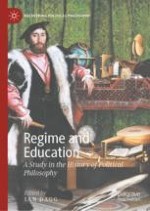2023 | OriginalPaper | Buchkapitel
Machiavelli’s Revolutionary Classical Education
verfasst von : John Peterson
Erschienen in: Regime and Education
Aktivieren Sie unsere intelligente Suche, um passende Fachinhalte oder Patente zu finden.
Wählen Sie Textabschnitte aus um mit Künstlicher Intelligenz passenden Patente zu finden. powered by
Markieren Sie Textabschnitte, um KI-gestützt weitere passende Inhalte zu finden. powered by
